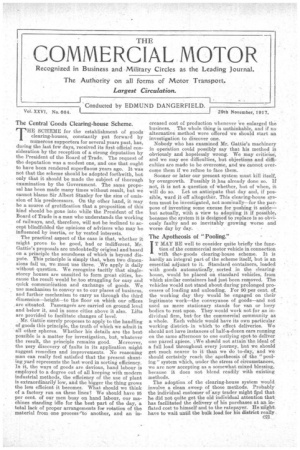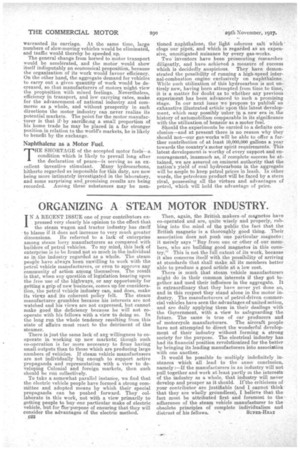The Cen tral Clearing-house Scheme. T HE SCHEME for the establishment of
Page 1

Page 2

If you've noticed an error in this article please click here to report it so we can fix it.
goods clearing-houses, constantly put forward by numerous supporters for several years past, has, during the last few days, received its first official consideration by the reception of a strong deputation by the President of the Board of Trade. The request of the deputation was a modest one, and one that ought to have been rendered superfluous years ago. It was not that the scheme should be adopted forthwith, but only that it should be made the subject of thorough examination by the Government. The same proposal has been made many times without result, but we cannot blame Sir Albert Stanley for the sins of omission of his predecessors. On the other hand, it may be a source of gratification that a proposition of this kind should be gone into while the President of the Board of Trade is a man who understands the working of railways, and, therefore, will not be inclined to accept blindfolded the opinions of advisers who may be influenced by inertia, or by vested interests.
• The practical aspect of the case is that, whether it might prove to be good, bad or indifferent, Mr. Gattie's proposals are undoubtedly original and based on a principle the soundness of which is beyond dispute. This principle is simply that, when two dimensions fail us, we must use three. We apply it daily without question. We recognize tacitly that single storey houses are unsuited to form great cities, because the result would be too straggling for easy and quick communieation and exchange of goods. We use mechanism to convey us to our places of business, and further mechanism to carry us through the third dimension—height—to the floor on which our offices are situated. Passengers are carried on ground level and below it, and in some cities above it also. Lifts are provided to facilitate changes of level. Mr. Gattie merely proposes to apply to the handling of goods this principle, the truth of which we admit in all other spheres. Whether his details are the best possible is a matter for investigation, but, whatever the result, the principle remains good. Moreover, the very discovery of faults in its application might suggest remedies and improvements. No reasoning man can really feel satisfied that the present shunting yard represents the last word in sorting efficiency. In it, the ways of goods are devious, hand labour is employed to a degree out of all keeping with modern industrial methods, the efficiency of the use of plant is extraordinarily= low, and the bigger the thing grows the less efficient it becomes. What should we think of a factory run on these lines? We should have 95 per cent, of our men busy on hand labour, our machines standing idle for the best part of the day, a total lack of proper arrangements for rotation of the material from one process qo another, and an in creased cost of production whenever We enlarged the business. The whole thing is unthinkable, and if no alternative method were offered we should start an investigation to discover one.
Nobody who has examined Mr. Gattie's machinery in operation could possibly say that his method is obviously and hopelessly wrong. We may criticise, and we may see difficulties, but objections and difficulties are made to be overcome, and we cannot overcome them if we refuse to face them.
Sooner or later our present system must kill itself, by overgrowth. Possibly it has already done so. If not, it is not a question of whether, but of when, it will do so. Let us anticipate that day and, if possible, ward it off altogether. This clearing-house system must be investigated, not nominally—for the purpose of inventing some excuse for pushing it aside— but actually, with a view to adopting it if possible, because the system it is designed to replace is so obviously fault and so inevitably growing worse and worse day by day.
The Apotheosis of "Pooling."
IT MAY BE well to consider quite briefly the function of the commercial motor vehicle in connection with thet, goods clearing-house scheme. It is hardly an integral part of the scheme itself, but is an essential adjunct to it. Standard containers, loaded with goods automatically, sorted in the clearinghouse, would be placed on standard vehicles, from which similar containers had just been removed. The vehicles would not stand about during prolonged processes of loading and unloading. For 90 per cent. of the working day they would be engaged on their legitimate work—the conveyance of goods—and not used as mere stationary stands for van or lorry bodies to rest upon. They would work not for an individual firm, but-for the commercial community as a whole. Each vehicle would have its own particular working district, in which • to effect deliveries. We should not have instances of half-a-dozen cars running on the same afternoon to one outlying spot to deliver one parcel apiece. We should not attain the ideal of a full load throughout every journey, but we should get much nearer to it than we do to-day, and we should certainly reach the apotheosis of the " pooling " system which, under the stress of circumstances, we are now accepting as a somewhat mixed blessing, because it does not blend readily with existing methods.
The adoption of the clearing-house system would involve a clean sweep of those methods. Probably the individual customer of any. trader might find that he did not quite get the old individual attention that has facilitated the delivery of his purchases at an inflated cost to himself and to the ratepayer. He inig;ht have to wait until the bulk load for his district really warranted its carriage. At the same time, large numbers of slow-moving vehicles would be eliminated, and traffic would thereby be speeded. up.
The general change from horsed to motor transport would be accelerated, and the motor would show itself indisputably an economical proposition, because the organization of its work would favour efficiency. On the other band, the aggregate demand for vehicles to -carry out a given quantity of work would be decreased, so that manufacturers of motors might view the proposition with mixed feelings. Nevertheless, efficiency in transport, and low carrying rates, make for the advancement of national industry and commerce as a whole, and without prosperity in such directions the motor industry can never realize its potential markets. The point for the motor manufacturer is that if by sacrificing a small proportion of his home trade he may be placed in a far stronger position in relation to the world's markets, he is likely to benefit by the exchange.
Naphthalene as. a Motor Fuel.
THE SHORTAGE of the accepted motor fuels--acondition which is likely to prevail long after the declaration of peace—is serving as an excellent inventive stimulant. Many hydrocarbons, hitherto regarded as impossible for this duty, are now being more intimately investigated in the laboratory, and some surprising and promising results are being recorded. Among these substances may be men tinned naphthalene, the light odorous salt which cIogs.our pipOS; and which is regarded as an expensive, unmitigated nuisance by every gas-works.
Two inventors have been prosecuting researches _diligently, and have -achieted a measure of success which is decidedly, auspicious. They have demonstrated the possibility of running a high-speed internal-combustion engine exclusively on naphthalene. While such utilization of this hydrocarbon is not entirely new, having been attempted from time to time, it is a matter for doubt as to whether any previous experiment has been advanced to such a promising stage. In our next issue we propose to publishan exhaustive illustrated article upon this latest -development, which -may possibly usher in a new era in the history of automobilism comparable in its significance with the utilization of benzoic as a motor fuel.
Should the experiments be carried to a definite conclusion—and at present there is no reason why they should not—our gas-works will be able to offer a further contribution of at least 10,000,000 gallons a year towards the country's motor spirit requirements: This latest development is worthy of every support and encouragement, inasmuch as, if complete success be attained, we are assured on eminent authority that the nation's yield of coal hydrocarbons in the aggregate will be ample to keep petrol prices in leash. In other words, the petroleum product will be faced by a stern rival, possessing all the virtues and advantages of petrol, which will hold the advantage of price,
























